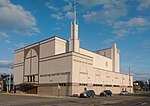Detroit Olympia
1927 establishments in Michigan1980 disestablishments in MichiganBasketball Association of America venuesBasketball venues in MichiganDefunct National Hockey League venues ... and 16 more
Defunct boxing venues in the United StatesDefunct college ice hockey venues in the United StatesDefunct indoor arenas in the United StatesDefunct indoor ice hockey venues in the United StatesDemolished buildings and structures in DetroitDemolished music venues in the United StatesDemolished sports venues in MichiganDetroit PistonsDetroit Red WingsEvent venues established in 1927Former National Basketball Association venuesIndoor ice hockey venues in DetroitOlympia EntertainmentSports venues completed in 1927Sports venues demolished in 1987Sports venues in Detroit

Detroit Olympia, also known as Olympia Stadium, was a multi-purpose arena in Detroit. Nicknamed "The Old Red Barn", it was best known as the home of the Detroit Red Wings of the National Hockey League (NHL) from its opening in 1927 to 1979.
Excerpt from the Wikipedia article Detroit Olympia (License: CC BY-SA 3.0, Authors, Images).Detroit Olympia
McGraw Street, Detroit New Center
Geographical coordinates (GPS) Address Nearby Places Show on map
Geographical coordinates (GPS)
| Latitude | Longitude |
|---|---|
| N 42.354444444444 ° | E -83.100555555556 ° |
Address
McGraw Street
48210 Detroit, New Center
Michigan, United States
Open on Google Maps








